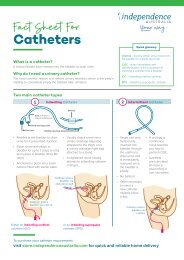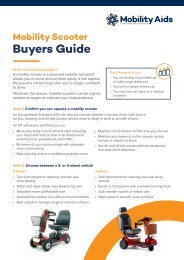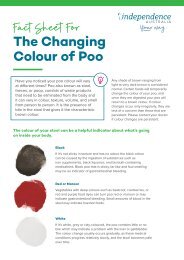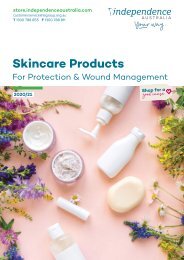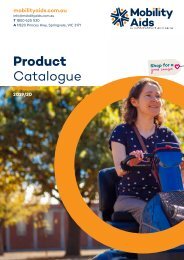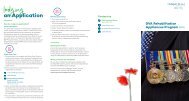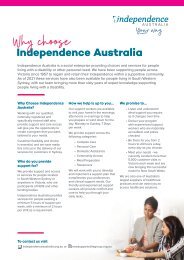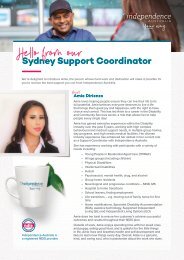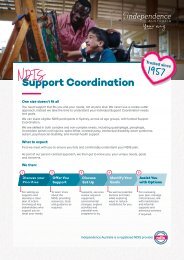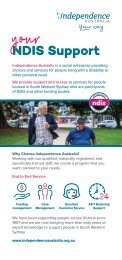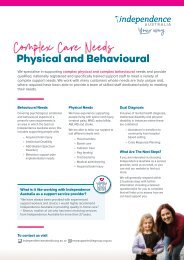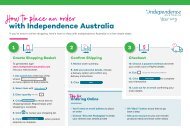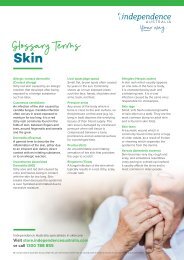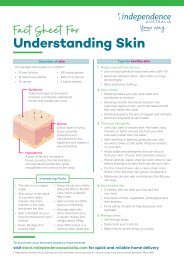Inform issue 26 – Summer 2019
This issue of Inform is all about closing odd 2018 and welcoming in a brand new year. We hear from Jarad, a presenter with Radio Adelaide about why he is bucking the 'people with disabilities cannot work' myth.
This issue of Inform is all about closing odd 2018 and welcoming in a brand new year. We hear from Jarad, a presenter with Radio Adelaide about why he is bucking the 'people with disabilities cannot work' myth.
You also want an ePaper? Increase the reach of your titles
YUMPU automatically turns print PDFs into web optimized ePapers that Google loves.
Feature<br />
informonline.org.au<br />
9<br />
I didn’t fare better with employment<br />
agencies, as nobody could offer me any<br />
advice or refer me on to work that catered to<br />
my skillset. While undertaking my Bachelor<br />
of Media undergraduate degree at the<br />
University of Adelaide, I approached Radio<br />
Adelaide 101.5 FM about doing a 60-minute<br />
program on disability-related content,<br />
but was knocked back due to having no<br />
proper framework. Often it occurred to me<br />
that management misjudged my interests<br />
in joining the station, but ableism never<br />
interfered with my later involvement at Radio<br />
Adelaide after completing my training in May<br />
2016.<br />
According to 2014-15 figures from the<br />
Australian Government’s Australian Institute<br />
of Health and Welfare, of those aged 15+<br />
who identify as being autistic 42% say<br />
that they are not in the labour force, while<br />
24% say they are employed and 34% are<br />
unemployed. Of the 2.1 million Australians<br />
with disability who are of working age, only<br />
1 million have found themselves a job, and<br />
over one-quarter of autistic jobseekers are<br />
involuntarily unemployed.<br />
A recent survey conducted by Autism<br />
Spectrum Australia (Aspect) discovered<br />
that most adults with Asperger’s Syndrome<br />
can’t get access to the support they need in<br />
achieving their career goals and aspirations.<br />
I had to persist in fighting to be heard by an<br />
industry that still has a very low percentage<br />
of employees with a disability or impairment.<br />
I was lucky <strong>–</strong> eventually Radio Adelaide did<br />
listen, and over the last five years I have<br />
involved myself with the radio station. My<br />
immersion at Radio Adelaide has made me<br />
to be more self-confident and self-assured<br />
in what my short- and long-term goals are<br />
in my career: to become the first radio<br />
presenter or journalist who is openly autistic<br />
and gay.<br />
Since then I have dabbled in some freelance<br />
journalism work with SBS, writing opinion<br />
editorials encapsulating the realities that<br />
Australia’s disability community faces daily.<br />
I do it without worrying about censoring or<br />
retracting what I say with my argumentative<br />
and personified opinions.<br />
Back in February this year, I applied for the<br />
ABC’s Media Cadetship Program as I thought<br />
I was ready to venture into the next stage<br />
of my career. When writing out my cover<br />
letter about having Asperger’s Syndrome,<br />
Ayme-Gripp Syndrome and other sensory<br />
impairments, tweaking or distorting the truth<br />
didn’t seem all that appealing to me.<br />
I believe that disclosing who you are<br />
to potential employers is important in<br />
promoting your work ethic, particularly when<br />
marketing your eligibility and productivity as<br />
a reliable employee. When deciding what to<br />
put into your resume before sending it off to<br />
businesses, double-check that everything is<br />
accurate and factual. The worst thing is to<br />
have two or more referees who are unable<br />
to be contacted by phone or email.<br />
My advice to future disabled jobseekers,<br />
including those who are autistic, is to refrain<br />
from suppressing or erasing your disability<br />
or impairment. If an employer is verbally<br />
or passively ableist, you shouldn’t sacrifice<br />
your mental health for financial stability. Also,<br />
remember to be well groomed and punctual<br />
when going to job interviews, as I guarantee<br />
you will be looked at more favourably. Who<br />
knows, you might just get that congratulatory<br />
call-back saying that you have been hired.<br />
Jarad will be a guest in our upcoming podcast<br />
episode on work and including your disability<br />
on your resume. You can find out more here<br />
www.informonline.org.au/listen



